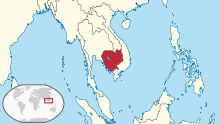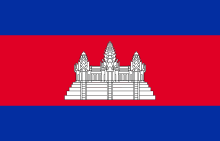Cambodia
country in Southeast Asia
Cambodia (/kæmˈboʊdiə/; Khmer: កម្ពុជា, or Kampuchea: IPA: [kam.pu.ciə], French: Cambodge), officially the Kingdom of Cambodia (Khmer: ព្រះរាជាណាចក្រកម្ពុជា, prĕəh riəciənaacak kampuciə, IPA: [prĕəh riə.ciə.naː.caʔ kam.pu.ciə]; French: Royaume du Cambodge), is a sovereign state located in the southern portion of the Indochina peninsula in Southeast Asia.


Quotes
edit- Once you’ve been to Cambodia, you’ll never stop wanting to beat Henry Kissinger to death with your bare hands. You will never again be able to open a newspaper and read about that treacherous, prevaricating, murderous scumbag sitting down for a nice chat with Charlie Rose or attending some black-tie affair for a new glossy magazine without choking. Witness what Henry did in Cambodia – the fruits of his genius for statesmanship – and you will never understand why he’s not sitting in the dock at The Hague next to Milošević. While Henry continues to nibble nori rolls & remaki at A-list parties, Cambodia, the neutral nation he secretly and illegally bombed, invaded, undermined, and then threw to the dogs, is still trying to raise itself up on its one remaining leg.
- Anthony Bourdain, A Cook's Tour: In Search of the Perfect Meal (2001), p. 162
- Is a holiday in Cambodia
Where people are dressed in black
A holiday in Cambodia
Where you'll kiss ass or crack
It's a holiday in Cambodia
Where you'll do what you're told
It's a holiday in Cambodia
Where the slums got so much soul- Dead Kennedys, Holiday in Cambodia (1980)
- In Cambodia, or Indo-China, Buddhism conspired with Hinduism to provide the religious framework for one of the richest ages in the history of Oriental art.
- Will Durant, Our Oriental Heritage : India and Her Neighbors.
- [Nixon] wants a massive bombing campaign in Cambodia. He doesn't want to hear anything about it. It's an order, to be done. Anything that flies on anything that moves.
- Phone call with Gen. Alexander Haig (9 December 1970) quoted in National Security Archive Electronic Briefing Book No. 123. The quotation was an excerpt from one of several phone conversations in which Kissinger ridiculed Nixon’s views about the war: "When Nixon proposed an escalation in the bombing of Cambodia, Kissinger and Haig felt obliged to humor the president while laughing at him behind his back" (Washington Post, May 27, 2004). Transcript at the National Security Archive
- In Cambodia, the Cambodian people, communists and patriots, have risen against the barbarous government of Pol Pot, which was nothing but a group of provocateurs in the service of the imperialist bourgeoisie and of the Chinese revisionists, in particular, which had as its aim to discredit the idea of socialism in the international arena... The anti-popular line of that regime is confirmed, also, by the fact that the Albanian embassy in the Cambodian capital, the embassy of a country which has given the people of Cambodia every possible aid, was kept isolated, indeed, encircled with barbed wire, as if it were in a concentration camp. The other embassies, too, were in a similar situation. The Albanian diplomats have seen with their own eyes that the Cambodian people were treated inhumanly by the clique of Pol Pot and Yeng Sari. Pnom Pen was turned into a deserted city, empty of people, where food was difficult to secure even for the diplomats, where no doctors or even aspirins could be found. We think that the people and patriots of Cambodia waited too long before overthrowing this clique which was completely linked with Beijing and in its service.
- Enver Hoxha, In regard to Cambodia, our Party and state have condemned the bloodthirsty activities of the Pol Pot clique, a tool of the Chinese social-imperialists. We hope that the Cambodian people will surmount the difficulties they are encountering as soon as possible and decide their own fate and future in complete freedom without any 'guardian'., in Selected Works Vol. VI, p. 419
- …Cambodia has gotten a damaging reputation as a country of scammers—a “scam-state”, if you like.
…Cambodia’s authoritarian political system, which isn’t about to open up, has denied space for ordinary people to express themselves as citizens. The next best thing would be to empower [the ordinary Cambodian nationals] as consumers.- David Hutt, "Cambodians need consumer rights NGOs in an era of scams and scandals", Radio Free Asia (January 14, 2024)
- The Nazis burned the works of Jews and other authors of whom they ideologically disapproved, but even more dreadful, it seems to me, was the action of the Khmer Rouge in Cambodia, at the start of the insane destruction of their country (including, in the end, the physical destruction of something like one-seventh of the entire population); in the sack of Phnom Penh which marked the beginning of their holocaust they burned every example of the printed word they could lay their hands on, from ancient Buddhist scriptures to hospital record-cards.
- Bernard Levin, Enthusiasms, Chapter 2 (1983)
- On 17 April 1975 the capital finally fell to the Khmer Rouge. Pol Pot — ruling with a tiny clique of comrades such as Ieng Sary and Khieu Samphan under the anonymous cover of ‘The Organization’ — declared that 1975 was “Year Zero’ and started to purge Cambodia of all non-communist influences. All foreigners were expelled, newspapers were outlawed and large numbers of people with the merest taint of association with the old regime — including all religious leaders, whether Buddhist, Christian or Muslim — were executed. There were even reports of people being killed because they wore spectacles — a sign of ‘bourgeois intellectuals’.
- Simon Sebag Montefiore, Monsters: History's Most Evil Men and Women (2009), pp. 326-327
- Pol Pot — now known as ‘Brother Number One’ — then embarked on an insane and doomed attempt to turn Cambodia into an agrarian utopia. The cities were cleared of their inhabitants, who were forced to live in agricultural communes in the countryside. In terrible conditions, with food shortages and crippling hard labour, these communes soon became known as the ‘Killing Fields’, where several million innocent Cambodians were executed. Despite a massive shortfall in the harvest of 1977 and rising famine, the regime arrogantly rejected the offer of outside aid. The country was now riddled with spies and informers, and even children were encouraged to inform on their parents. Pol Pot went on to conduct purges within the Khmer Rouge itself, leading to the execution of more than 200,000 members.
- Simon Sebag Montefiore, Monsters: History's Most Evil Men and Women (2009), p. 327
- Neglect in protecting our heritage of natural resources could prove extremely harmful for the human race and for all species that share common space on planet earth. Indeed, there are many lessons in human history which provide adequate warning about the chaos and destruction that could take place if we remain guilty of myopic indifference to the progressive erosion and decline of nature’s resources. Much has been written, for instance, about the Maya civilization, which flourished during 250–950 AD, but collapsed largely as a result of serious and prolonged drought. Even earlier, some 4000 years ago a number of well-known Bronze Age cultures also crumbled extending from the Mediterranean to the Indus Valley, including the civilizations, which had blossomed in Mesopotamia. More recent examples of societies that collapsed or faced chaos on account of depletion or degradation of natural resources include the Khmer Empire in South East Asia, Eastern Island, and several others. Changes in climate have historically determined periods of peace as well as conflict. The recent work of David Zhang has, in fact, highlighted the link between temperature fluctuations, reduced agricultural production, and the frequency of warfare in Eastern China over the last millennium. Further, in recent years several groups have studied the link between climate and security. These have raised the threat of dramatic population migration, conflict, and war over water and other resources as well as a realignment of power among nations. Some also highlight the possibility of rising tensions between rich and poor nations, health problems caused particularly by water shortages, and crop failures as well as concerns over nuclear proliferation.
- The arms dealers were of especial interest to me. They commonly operated on street corners (some nights, in certain quarters, there seemed to be one on almost every corner) and offered a wide selection of handguns and ammo, the odd assault weapon—hardly surprising in a country where you could, I've been told, blow away a cow with a rocket launcher for a fee of two hundred dollars, less if you were prepared to haggle. I saw in them the future of my own country, where death was celebrated with equal enthusiasm, although candy-coated by Technicolor and video games and television news. When the coating finally wore off, as it threatened to do, there we would all be, in Cambodia.
- Lucius Shepard, Dog-Eared Paperback of My Life (2009), in Nick Gevers and Jay Lake (eds.), Other Earths (p. 249)
- However, the most cruel mistake occurred with the failure to understand the Vietnam war. Some people sincerely wanted all wars to stop just as soon as possible; others believed that there should be room for national, or communist, self-determination in Vietnam, or in Cambodia, as we see today with particular clarity. But members of the U.S. anti-war movement wound up being involved in the betrayal of Far Eastern nations, in a genocide and in the suffering today imposed on 30 million people there. Do those convinced pacifists hear the moans coming from there? Do they understand their responsibility today? Or do they prefer not to hear?
- Aleksandr Solzhenitsyn, "A World Split Apart" 8 June 1978
- This bombing went on for five years. The Supreme Court never passed any judgment on it and the military speaks with pride today that five years of the bombing of Cambodia killed 16,000 of the so-called enemy. That's 25% killed, and there's a military ruling that says you cannot kill more than 10% of the enemy without causing irreversible, psychological damage. So, five years of bombing, a diet of bark, bugs, lizards and leaves up in the Cambodian jungles, uh, an education in Paris environs in a strict Maoist doctrine with a touch of Rousseau, and other things that we will probably never know about in our lifetime -- including, perhaps, an invisible cloud of evil that circles the Earth and lands at random in places like Iran, Beirut, Germany, Cambodia, America -- set the Khymer Rouge out to carry out the worst auto-homeo genocide in modern history.
- Swimming to Cambodia (1987)
External links
edit| Find more information on Cambodia by searching Wikiquote's sister projects | |
|---|---|
| Encyclopedia articles from Wikipedia | |
| Dictionary definitions from Wiktionary | |
| Textbooks from Wikibooks | |
| Source texts from Wikisource | |
| Images and media from Commons | |
| News stories from Wikinews | |
| Learning resources from Wikiversity | |